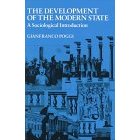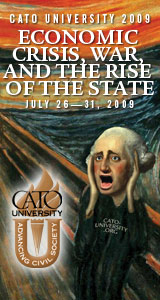
I’m on a train at the moment (how the world has changed; I can publish my thoughts while traveling on a train) and finishing up Gianfranco Poggi’s The Development of the Modern State: A Sociological Introduction in preparation for one of my lectures later this week at the Cato University. It’s a very interesting and enlightening book, marred only occasionally by too many unthinking concessions to Marxism (regarding class antagonisms, for example), although he rejects the overall Marxist perspective. I’ve also enjoyed reviewing my old dog-eared copy of Alexander Rüstow’s Freedom and Domination: A Historical Critique of Culture, John Kautsky’s The Politics of Aristocratic Empires, and other works. One of my goals for the lecture is to combine such sociological/historical investigations with sound economic analysis, as a preface to Robert Higg’s lecture on the fundamentals of public choice economics.
There will be more than 200 participants in this year’s Cato University, thanks to the hard work of my colleagues at the Cato Institute and, I suspect, to the enormous relevance of this year’s topic: “Economic Crisis, War, and the Rise of the State.”











Dear Tom
I am not sure whether this particular comment has any direct relevance to the above post. Nonetheless…
I was just wondering whether the businesses keep quiet in the face of the government interference because of a return favour in the past, present or future time. The empirical evidence to support the above hypothesis will be hard to gather and confirm. Is it a price paid by the whole business community in return for the bail-outs, protection seeking against foreign competitors, and other such activities of the few firms…?
Anyways, the gradual rise of the state meddling into the affairs of the businesses is gathering pace and the mainstream media including the businesses themselves have been relatively quiet on the subject. The virtues of laissez- faire are scarcely talked about, much less considered in the public policy debates.
The “Freedom to Trade Campaign” is indeed a great work in the right direction… but its effectiveness with the people in the power is not immediately visible. Hoping that the campaign gathers momentum in these challenging times.
Thanks.